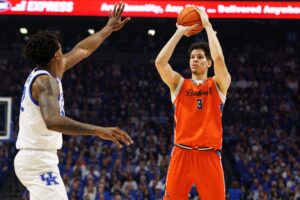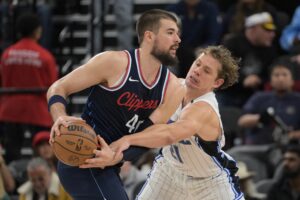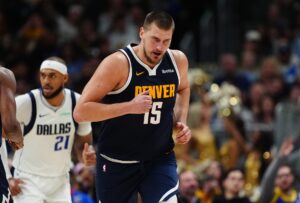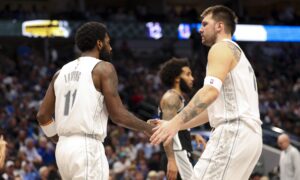The NCAA has consistently come under fire for not paying its student-athletes. Those same athletes generate ridiculous amounts of funding for athletic departments which in turn fund upwards of 80 percent of other institutional spending. Clearly, student-athletes play a major role in the success of colleges and universities. Now, professional basketball has created an attractive model for high school athletes to enter, bypassing the college level.
How Jalen Green Affects the NCAA
High School to the G-League
In 2018, Darius Bazley chose to bypass Syracuse for the NBA G-League. At the time, he signed a small contract with the G-League and was preparing to train for the NBA Draft the next year. However, he was also presented with an at-worst one million dollar contract from New Balance. There would be few people in the world that would pass that opportunity up.
It is important to remember that the overwhelming majority of these athletes have a dream of playing in the NBA. College is viewed as a one year stop for most great players, rather than a dream.
For a long time, there were no other great options for a high school basketball player besides college. But Bazley’s decision started a snowball effect that will have a lasting impact on the college basketball landscape.
The 2019 high school class saw the defection of two highly touted recruits to professional leagues. LaMelo Ball and RJ Hampton both chose to head to the National Basketball League in Australia. While neither player had major success, they still made plenty of money and are projected lottery picks this year.
Jalen Green Changes the Landscape
Now, Jalen Green, a unanimous top-three recruit in 2020, chose to bypass the NCAA for the NBA G-League. However, there is a major difference between Green and the aforementioned players. Green will reportedly receive nearly one million dollars and be placed in a developmental program that will allow him to learn from former players and coaches. That is a massive increase in the contracts previously offered to G-League players.
Reporting w/ @Draftexpress: Jalen Green is making the leap to a reshaped NBA professional pathway program, a G-League initiative that’ll pay elite prospects $500K-plus and provide a one-year development program outside of minor-league’s traditional team structure. Story soon.
— Adrian Wojnarowski (@wojespn) April 16, 2020
Green is not going to be playing in the G-League. Rather, he will go through a developmental program and play against some G-League teams, national teams, and NBA academies. He will also do appearances and endorsements which will allow him to earn more money. Obviously, none of this would be possible in the NCAA.
Green is the first step in the new initiative to recruit elite high school talent and get them in NBA systems as early as possible to speed up their development. For players, it is a win-win because they can get stronger and more NBA ready, while also making a solid income.
Other Players Pursuing Professional Opportunities
Joining Green is Isaiah Todd. Todd recently de-committed from the Michigan Wolverines and will be following Green to the G-League developmental program. Todd is another top 20 recruit that was a projected NBA pick for 2021.
Isaiah Todd (@zaytodd) has spoken to @JalenGreen about teaming up on @nbagleague team in Cali: “We’re both excited to get to work. Players can look at us and use this as an alternative route…even motivation for them.”https://t.co/S18NAM852I
— Shams Charania (@ShamsCharania) April 17, 2020
While none of it is confirmed yet, Jalen Suggs and Terrance Clarke also seem keen on the idea of joining the G-League or a professional league and bypassing college. Suggs signed his National Letter of Intent to Gonzaga and Clarke chose Kentucky, but both can opt for the professional route at any time. The increasing belief is neither player will be in the college game next season.
Finally, Greg Brown, who is strongly considering Auburn and Texas, has been offered $500,000 to join the G-League with the others. If all of these players mentioned bypass college, which seems more likely than not, the NCAA will see four of the top ten recruits not play college basketball next season.
What Does This Mean for the NCAA?
College athletes are crucial for their schools to function. At this point, the NCAA has two choices. They can either pay the players or allow the best of the best to bypass their league altogether.
In COVID-19 times, universities are scrambling to find ways to get back on the field and court. If this happens, the NCAA would deem players as essential employees. However, they have fought forever to make sure the players are not treated as NCAA employees.
Everyone claims that the colleges do not have the money to pay players. First of all, that is entirely false. They make a ridiculous amount of money on athletics and at least some of that can easily go back to athletes with no impact on the school, other than the administrations’ pockets.
Additionally, the NCAA, a nonprofit organization, generates one billion dollars in revenue per year from athletics. They could easily help provide funding for athletes. Yes, giving them a scholarship is outstanding, but they deserve more.
The one issue is how to make the funding fair. That is impossible. Players at bigger programs will get more opportunities. However, how is that much different than right now? Players at Blue Blood schools get more attention and are more likely to be drafted. Generational talents like Ja Morant gain their own attention.
The Solution
With the NBA and NBL providing lucrative options for high school athletes, the NCAA has to change its model. The easiest possible solution is to allow athletes to profit off their image and likeness. Essentially, this means athletes can sign autographs, make celebrity appearances, and sign endorsements to pad their pockets while at school. This would cost next to nothing for universities or the NCAA.
Think about players like Ja Morant and Zion Williamson. Both could have made a ton of money while in college last year. Williamson even said he wanted to return to school but it was not the best choice for his family. If he could have received payment, Williamson would be in college this year and the NCAA brand would skyrocket. Who does not want that? The NBA would get a more polished player and college basketball would be raised to a higher level.
Money and greed rule all. The NBA has now forced the issue and without a change from the NCAA, the product will suffer. Yes, the college game will always be competitive and have solid four-year guys, but they will miss out on the generational talents.
Is Jalen Green going to destroy the NCAA? No. Would the NCAA be better with Green in it? Absolutely. Your move, Mark Emmert.
Main Photo
Embed from Getty Images






